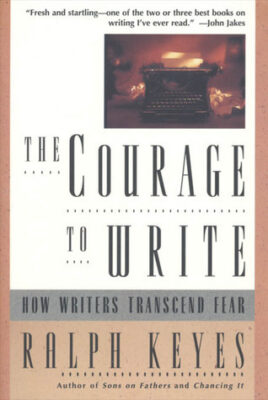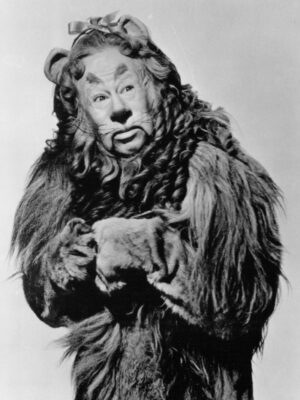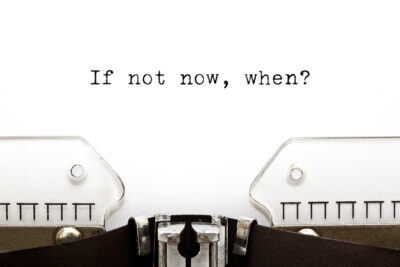
Far from being fearless, authors tend to be anxious people who are duking it out with their anxieties on the page.
They don’t write despite their fear but because of it. They want to wrestle the alligator.
~ Ralph Keyes
I heard them before I saw them. My nephews, age eight and ten. Huddled behind the door, giggling. I leaped out of the flimsy folding chair, my knees bumping the card table so hard my typewriter squealed.
I grabbed the doorknob and jerked the door open. The boys fell backward onto the blue-and-green paisley carpet that my mother-in-law loved so much. Sprawled there, cat-like, bellies exposed, they had the good sense to look remorseful.
“Were you spying on me through the keyhole?” I demanded.
“Yes. Mom told us you were writing. She told us it was a big joke,” the ten-year-old whimpered, strands of fine, brown hair falling across his forehead. The eight-year-old said nothing, his glacier-blue eyes downcast.
“Go and ask Grandma if you can help her fix dinner,” I suggested, pointing to the stairs. Dinner would likely be a can of Chef Boyardee ravioli because they wouldn’t eat anything else.
Truth be told, I was trying to write. And I regretted telling anybody anything about it, especially my gossip-loving sister-in-law.
I’d been staring at the typewriter for an hour. The only ink on the blinding-white paper was a smudge from my fingertips after I’d changed the ribbon.
Writing scared me enough on its own. But when people in my own family thought my efforts worthy of humor, well, that really hurt.
It sapped my courage.

And did I ever need courage! The Cowardly Lion in “The Wizard of Oz” had nothing on me. No, he didn’t, at least when it came to wanting a strong heart.
And a thick skin.
So, years later, when Ralph Keyes’s The Courage to Write crossed my path, I regarded it as an omen. It became my talisman. And it was yet another one of the tomes I saved after the great 2020 purge, when I discarded most of my books during the pandemic.
The Courage to Write turned out to be a great big pep talk for writers like me. That’s why I kept it close.
Four pages into the text, I came upon a quote from the illustrious E.B. White:
I admire anybody who has the guts to write anything at all.
Yes!
Following that, I lingered over quotes Keyes included from many other writers. All admitted writing can be more frightening than public speaking. It is! Consider a few gems:
One of the marks of a gift is to have the courage of it.
I write in terror. I have to talk myself into bravery with every sentence,
sometimes every syllable.
You need a certain amount of nerve to be a writer, an almost physical nerve, the kind you need to walk a log across a river.
When I read that section, and especially the quote from Margaret Atwood, I yelled to the walls, “My goodness, if MARGARET ATWOOD feels like that, then maybe I am not as messed up as I thought I was!”
Writers do have many reasons to be terrified. Writing can be as dangerous and fearsome as wrestling alligators.
Keyes lists seven major dilemmas writers fear:
Can I Pull It Off?
I Can’t Write About That!
Page Fright
The Paper Partner (the critic)
Evicting the Baby (letting go of the manuscript)
Galley Jitters
Advance-Copy Anxiety
Post-Publication Panic
The first three loomed over me at the beginning of my writing life. Especially the second one. It took me a while to feel comfortable expressing certain emotions, telling particular stories, revealing memories. But I’ll confess, all of these dilemmas have haunted me at one time or another. And a lot of the time, they still do.
Writing about others and risking their wrath takes one type of courage. Writing from within … takes another.
“Writing is a form of performance,” Keyes observes. And performance of any kind means exposure.
And not always TikTok or Twitter exposure, camera flashes popping and red carpets rolling, fawning reviews and hungry agents clamoring to represent the newest shiny bard. The flip side of exposure brings with it the wrath Keyes mentions. The less-than-kind reviews. The green-eyed monster. Friends and acquaintances who scatter like cockroaches in the face of any success.

![]()
![]() Keyes delves into the depths of a writer’s angst, revealing the complexity behind a writer’s dread of exposure. He doesn’t mince words.
Keyes delves into the depths of a writer’s angst, revealing the complexity behind a writer’s dread of exposure. He doesn’t mince words.
Any writing exposes writers to judgment about the quality of their work and their thought. The closer they get to painful personal truths, the more fear mounts, not just about what they might reveal but about what they might discover should they venture too deeply inside. To write well, however, that’s exactly where we must venture.
In the end, Keyes insists that fear is the writer’s ally. He offers an encouraging list of eleven “Courage Boosters” at the end of The Courage to Write.
I laughed when I read the last one:
- Write
So go wrestle that alligator.
________________________
This post is the third of four about books that encouraged me to take myself seriously as a writer.

Mary Bast
Beautifully written, and you’ve touched an emotional cord, Cynthia. I feel so “known” by your words. I, too, had early reactions to my writing that tested my courage; some overt but often slant-wise criticisms such as “Why do you want to write about that?” I was finally freed in my early sixties by a writers group that was a precursor to WAG, whose guidelines recognized our fears and provided both loving support and thoughtful feedback, encouraging more without diminishing the spirit.
Cynthia D. Bertelsen
Thank you, Mary. I think many writers would agree with you. Writing is such a fraught business sometimes!